Every Friday, we meet a member of the BFS and peer deep into their soul (or, at least, a form they filled out). Want to be featured? Email us: online@britishfantasysociety.org
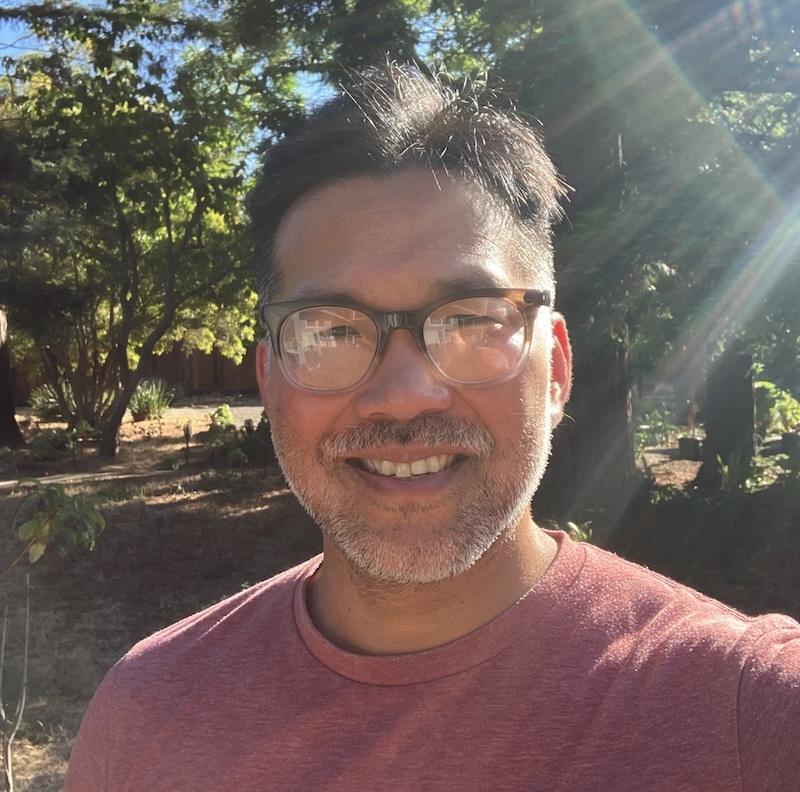
Name:
Eric Huang (he/him)
Which region are you based in?
London
If you write, which genre:
Fantasy
Are you drawn to any specific SFFH sub-genres?
I’m particularly drawn to genres that delve into myths, folklore, and spiritual beliefs.
Your influences
Tell us about the book/film/thing that got you into SFFH: What was it? How old were you? What impact did it have on you?
My dad told me and my sister Chinese legends at bedtime. He’d put us in the stories and incorporate our school, the local pizza joint, Superman, Smurfs, ABBA. The stories felt so present and a part of our everyday lives. His Monkey King retellings led me to Greek myths, then Lord of the Rings, Chronicles of Narnia, and so on …
(Pictured: Eric and his sister in New York City, circa 1977)

When Star Wars Ep IV came out, my mind was BLOWN! I got into comics soon after that, especially X-Men—and I dove into sci-fi with G-Force and other Japanese TV shows.
My intro to horror was through music: Siouxsie Sioux, Sisters of Mercy. The references in their music drew me to Gothic fiction.
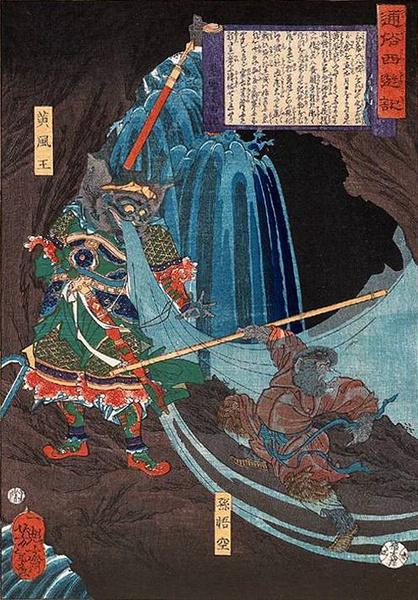
How does that early influence show up for you (in life/writing/agenting/publishing/editing/reading) now?
The Guardians of the New Moon chapter book series is directly influenced by my dad’s bedtime stories. The first book, The Great Race, is a reimagining of the legend that explains how the animals on the lunar zodiac got their places. Subsequent books focus on each of the animals and incorporate other legends. Like my dad’s stories, these are reimaginings.
(Pictured: Monkey King fighting a wind demon)
Where do you draw your creative inspiration from?
I mentioned my dad’s bedtime stories. Another source of inspiration is Catholicism. I was raised Catholic, and I’m still obsessed with saints’ stories. I host a podcast called Saint Podcast which explores saints’ legends. It’s not devotional, though; it’s a social history of hagiographies, tracing their origins and how each figure has changed through time to suit cultural and political needs. Hagiographies are just like the fantasy stories I love with dragons, demons, magic, and the uncanny. We humans created sacred stories to explain the unexplainable and to endure the everyday. Even the most unassuming things can spark creativity—as long as I’m paying attention.
(Pictured: Saint Sebastian by Mattia Preti, a painting of Eric’s favourite saint)
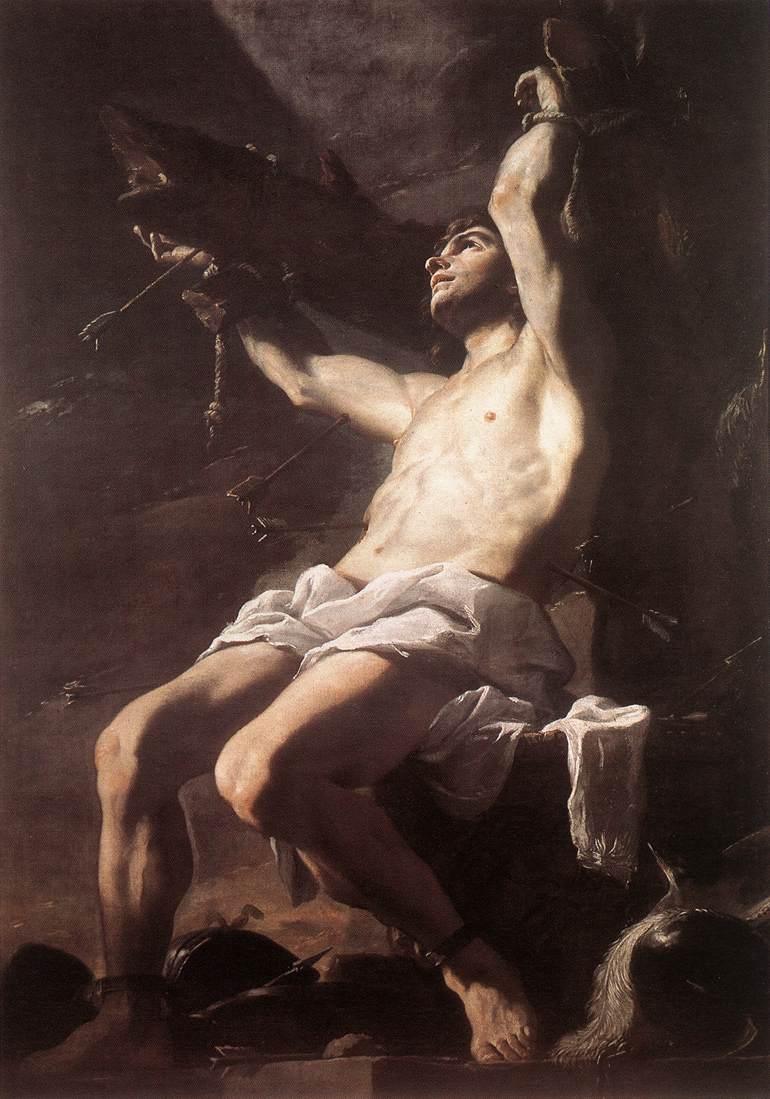
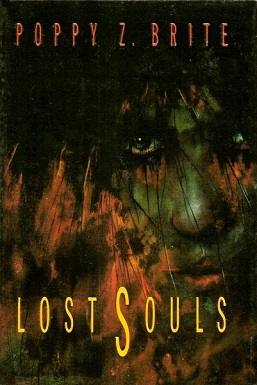
Who do you look to as a genre hero? Why?
Billy Martin was a formative genre hero. It was Lost Souls, which he wrote as Poppy Z. Brite, that led me to Anne Rice’s novels and vampires in general. I love Lost Souls—and also Drawing Blood. They shocked and excited me because they were so overtly queer. Queerness depicted as supernatural resonated with me as I was coming to terms with my own identity.
Your Work
You’re stuck in an elevator for 60 seconds with that hero, and they want you to describe your work. Give us the pitch.
I write about the stories that formed me: Chinese legends, Catholic legends, the legends that underpin what it means to be Californian, to be from LA, to be a Londoner, to be gay.
You know, if I were suck in an elevator with Billy Martin, I don’t think I could talk about my own work. I’d just … gush. I’d want to know how he imagines Ghost and Steve’s lives unfolded.
What are you working on right now?
I’m working on an idea that’s a different take on werewolves—more fantasy than horror … It’s very rough.
Thinking about all the stories/work you’ve done, what sticks out most in your mind? Why?
Exploring real-life issues and challenges through fantasy has helped me deal with my own sense of self and … the news. Writing The Year of the Tiger about a tiger with anger management issues due to the destruction of her forest home was therapeutic! Same with the Year of the Ox, about a young ox whose dad expects him to be a warrior instead of the dancer he dreams of becoming.
(The Year of the Tiger publishes in January 2026)
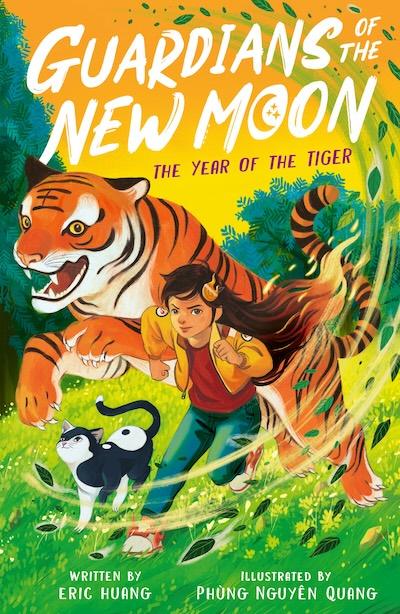
Where and when do you create/are you at your most creative?
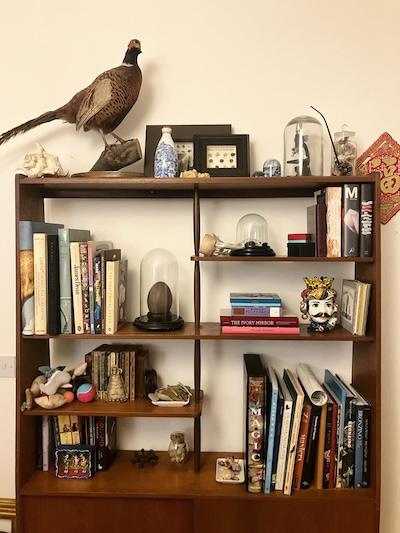
I always imagined that being a writer would be like … sitting in a cottage in the woods or typing from a balcony overlooking the Adriatic—the manuscript materialising effortlessly. But it’s rarely been like that. I have to make myself write—but when I do, the time flies and the words flow.
I do my best work at the library. I’m lucky that there are two within walking distance form my flat. When I’m there, I’m in work mode: headphones on, head down.
(Pictured: the bookshelf in Eric’s lounge room)
What’s the best advice you’ve received about creativity?
My friend Emma pointed out that rest is a core component of creativity. I was raised to categorise leisure time as wasteful, lazy. This is so untrue! Scheduling time to be inspired, to let your mind wander is as necessary as cultivating a disciplined creative habit. The idea that creativity is only measured by productivity is garbage.
What’s your writing soundtrack?
I grew up in the 80s. My writing playlist is painfully Gen X: Siouxsie, Depeche Mode, B-52s, Pixies …
(Pictured: Eric and friends “gothed up and ready for a night out” in San Francisco, circa 1994)
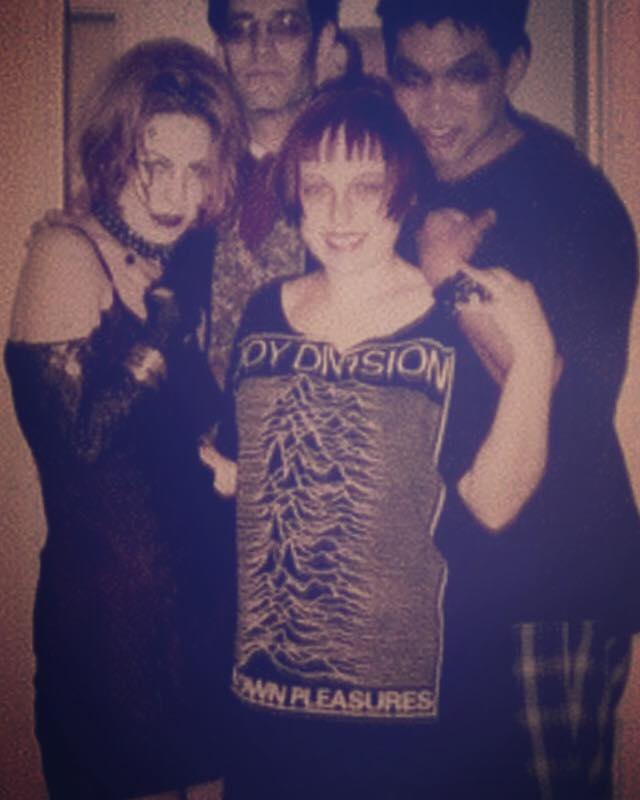
The Quick-Fire Round
Sci-fi, fantasy or horror?
Fantasy
Quiet or loud?
Quiet
Dark or light?
Dark
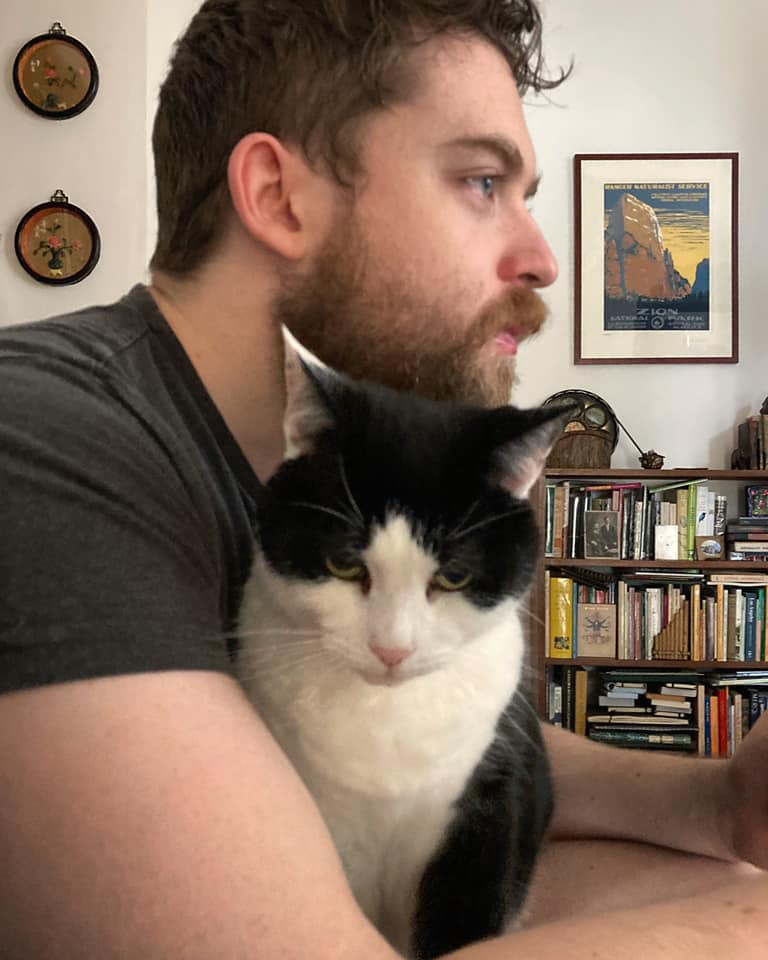
Strict lines or genre blend?
Blend!
Awards or bestseller?
Awards
Fiction or non-fiction?
Fiction
Poetry or prose?
Prose
Plotter or pantser?
Pantser!
Reading or listening?
Reading
(Pictured: Eric’s partner Brian with their cat McNulty, named after Dominic West’s character in The Wire—and the inspiration for Miaow from the Guardians of the New Moon books)
Notebook or computer?
Laptop?
Favourite SFFH book of all time?
The Monk by Matthew Lewis
Last book you read?
I’m halfway through The Dangerous Kingdom of Love by Neil Blackmore. It’s heart-breaking!
Any SFFH author on auto-buy?
RF Kuang
Favourite podcast?
You Must Remember This
The Home Stretch
What’s the best thing about being part of the SFFH community?
The best thing about being part of this community is feeding into and drawing from a creative collective that imagines a different, better world. Having people around me who take steps to make their speculative ideals a reality in the same way that the generation who grew up on Star Trek and The Jetsons invented touchscreen phones and video calls.
(Pictured: Dark Carnival bookstore in Berkeley, California—Eric’s favourite bookstore)
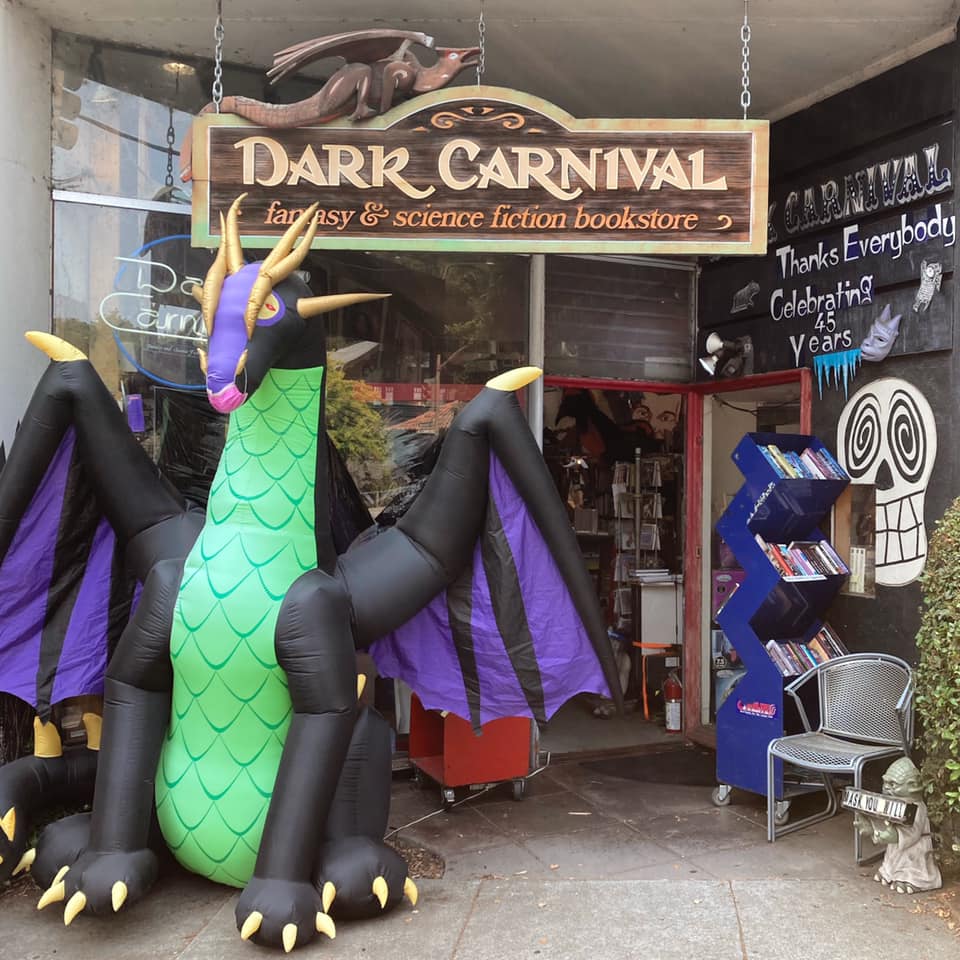

Time to plug your stuff! Where can we find you and your work? What have you got coming up? Consider this your advertising space.
The Guardians of the New Moon chapter book series is available at Bookshop.org and independent booksellers. Listen to Saint Podcast on all podcast platforms. And join a live streaming SFF festival called Imaginarium this Sunday! I’ll be moderating an industry panel.
The BFS is proud to again partner with Lian Connect on Imaginarium; get the details and your £5 member tickets over here.

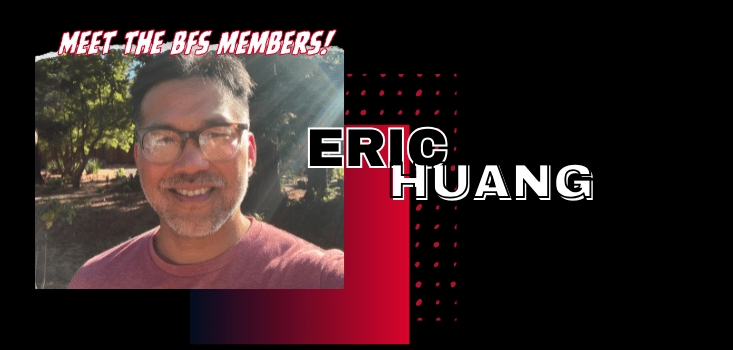
One response to “Meet Eric Huang”
Hi, I am a self published author who has just released my latest fantasy novel. I have been writing for around ten years, I started writing at fifty years of age. Promotion of older writers who are new to the game is rather lacking in the industry.